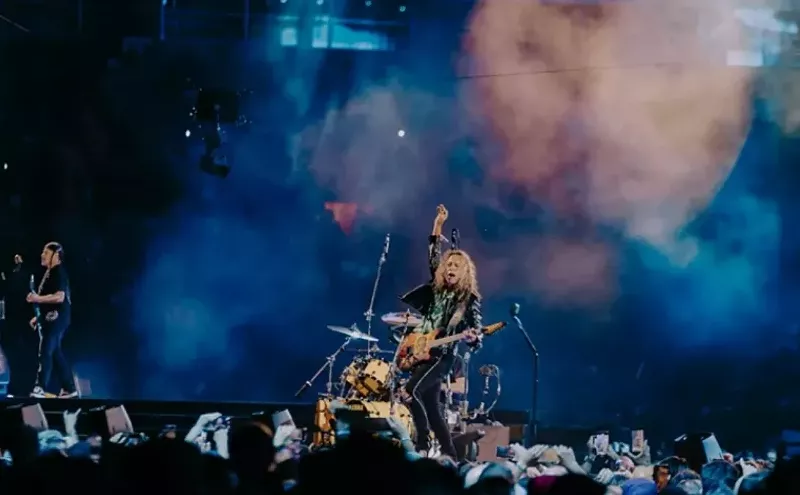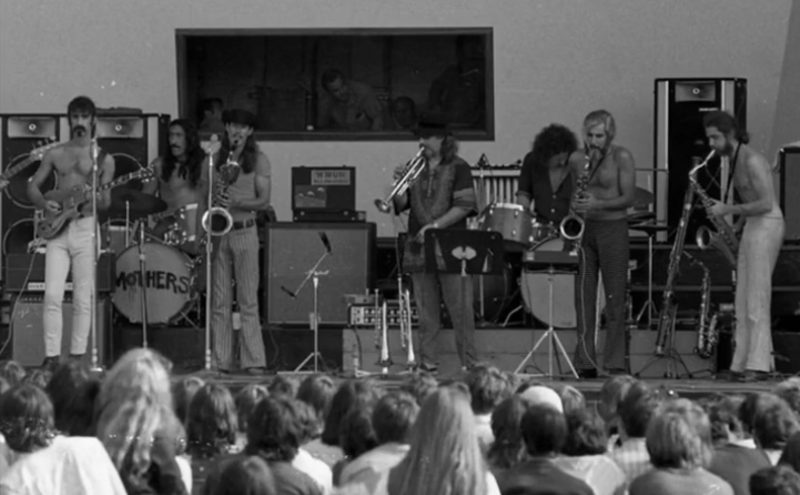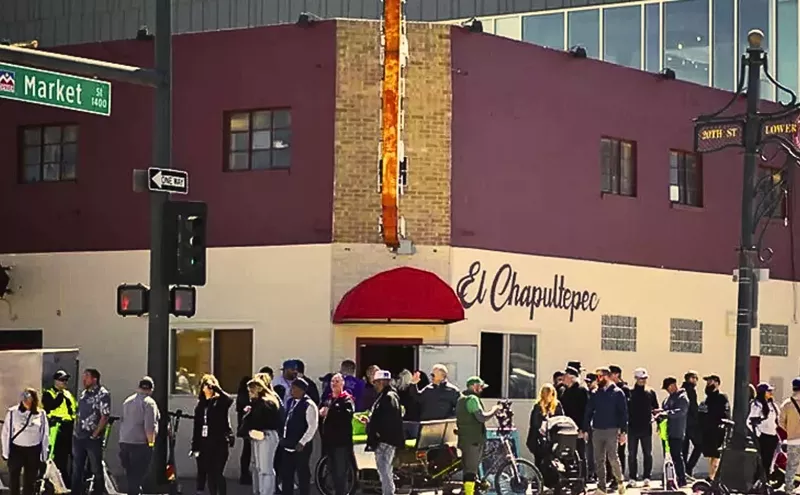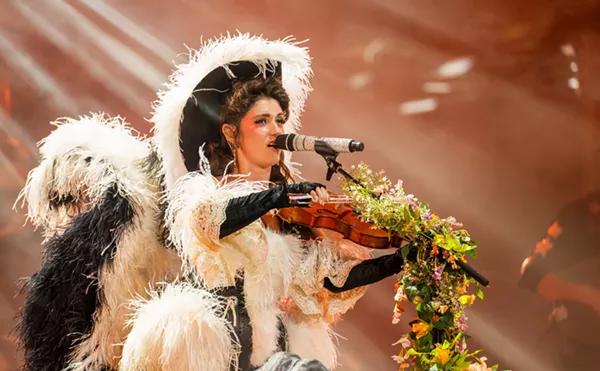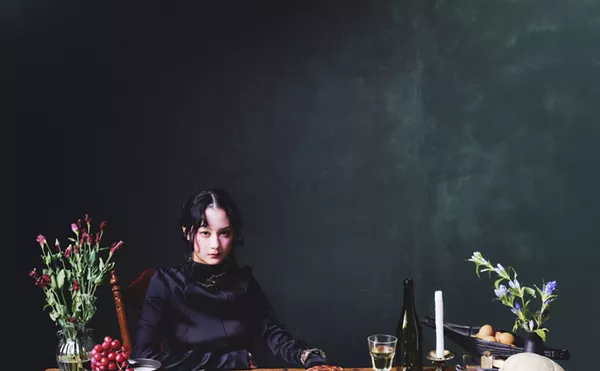In advance of his lecture at RMCAD this Wednesday, January 21 and a performance at the Larimer Lounge on Thursday, January 22, Blanco spoke with Westword about how he went from a social media performance piece based on a fictional teenage girl and aspiring rapper living in New York City to the global artist he is today.
See also: Where Were You When Mykki Blanco Played at Rhinoceropolis?
Bree Davies: You're performing at the Larimer Lounge on Thursday, but prior to that, you're speaking at RMCAD as part of the school's Visiting Artist, Scholar, and Designer Program. Can you talk a little about your lecture, Sexual Politics and the Logistical Business Strategies in Independent Music?
Mykki Blanco: Basically, the lecture is going to focus on the experiences, logistically, that kind of led up to me doing what I'm doing: My background at the time -- being an unemployed artist in New York City, and how I was able to take a social media art project...and start to build a reputation on my live performances that led to me seriously writing songs. Then, through the popularity of those songs, I was able to get a manager, who then said to me, "How far do you want to go with this project? Is this just a conceptual art project?"
[In this lecture], I basically explain that from I went from working with producers to having a music video to working with an American booking agent to working with a European booking agent and an Asia booking agent, and then all of a sudden I had a publicist and my music was on iTunes.
I want to explain to students that working as an independent artist transferring from the art world to the music world...is not as difficult as people think. It just takes a lot of patience and hard work and certain logistics.
I think there is a veil over a lot of college students' eyes about how to actually work in the real world or how to actually achieve something. So I didn't want to give a lecture that was just about my performance practice or talk about creativity -- I didn't want to give a vague lecture that would reiterate a lot of the same things visiting artists say. For me, I would have gained so much if I had had a visiting artist come and actually talk about how they set up their business. It's a blueprint that anyone can follow.
The other half of the lecture will be me talking in an autobiographical narrative about the birth of Mykki Blanco and how I did not start in the drag community. Mykki Blanco began because I was actually, for the first time, having a bit of my own sexual revolution -- I started cross-dressing and living a transgender lifestyle. Mykki Blanco came out of that, but it wasn't a lineage of drag performance.
When I combined Mykki Blanco with this other punk/noise project I was doing, it was this unorthodox idea about someone in drag also doing hardcore forms of music, as in hardcore punk and hardcore rap music.
I'm going to talk about the discrimination I faced from many people and the many forms of discrimination. Because of drag's context in a comedic sense, people didn't really take my talent seriously at first.
Also, I'll talk about web sites and publications that will now gladly publish my video or songs that, back in 2012, wouldn't even think of it. I'll talk about the "gay rap" phenomenon and how that was labeled, and how I feel like certain artists, we had to rebel against that label. I'll talk about how it is unfortunate that we as a community could have rallied around together but writers -- especially music critics -- were making [the music] this niche trend. We didn't even get a chance to have a sense of community because we were all so concerned -- and rightly so -- about protecting our own identities.
I'm also going to talk to the kids really, really bluntly about how, if they want to start working as an independent performer, how they can do it, from my experience.
You mentioned that Mykki Blanco was born out of a social media art project. What was that initially and how did the project manifest into what it is now?
One day during the big publicized media fight between Nicki Minaj and Lil' Kim, I had an idea to make a video project about an eighteen-year-old girl who would be a senior in high school who aspired to be a female rapper. I had dressed up in drag before, but very rarely.
I dressed up in drag and made a Mykki Blanco Facebook profile, and I transformed my apartment at the time in Bushwick to look like a teen girl's room. I bought posters of Drake and Rihanna and had pink sheets.
The first Mykki Blanco video -- which I may show during the lecture -- is just a diaristic video based on YouTube videos where teenage girls will basically talk to the camera and tell about their day or what they bought. They're called "haul videos" and they are very literal -- it's like, "I went to Forever 21 today and this is what I bought and it cost $14.99." It's this show and tell that I found very interesting. That was how Mykki Blanco was first introduced to the world, through social media videos and through a Facebook profile. Then it was probably a few months after that Mykki -- myself -- began being associated as this public persona I had, this video art persona. In these videos, I would talk about my aspirations of being a rapper and one of my friends was like, are you going to actually rap? You should write rap songs for Mykki.I thought it was a good idea, so I got on GarageBand on my Mac laptop and started playing around. The whole thing was a very loose, free-form art project. At the time I had three jobs -- one of them was at OHWOW Book Club. I had published a book in June of 2011, and that was really how my name got out there. But it was as Michael David Quattlebaum Jr. I had entered the artwork press machine via the book -- so people knew who I was, but based solely on the book. I had performing the poems in the book as a punk act called No Fear.
The No Fear project -- my punk performance noise project -- that is really at the heart of Mykki Blanco. The drag persona was a completely separate thing, but I basically began to perform Mykki Blanco's little raps at underground parties -- Venus X Ghe20 G0th1k in New York City was where I debuted. People had never seen this side of me, but they were genuinely enjoying the raps. Little by little I wrote more raps and I put more of them online. At a certain point, a good four or five months, I had a good repertoire of material and I could actually put together a stage show.
Mykki Blanco was still a separate project from the punk/noise project. But then I threw a party with my friend Daniel Fisher at a drag bar called Lucky Cheng's, and at the time there was House of Ladosha New York City -- it seemed like there was a new little scene that were doing performance art and drag and club kid stuff, and it just seemed like there was a renaissance of this style. At this one particular party, I decided to combine the raps of Mykki Blanco with some of the punk songs of the No Fear project. When I combined the two into one performance set, that's when everything changed.
It blew people away -- the compliments, the accolades, the interest -- it just made everything come full circle, because it became this completely new thing. People were telling me, "You have something. You should keep working on this; it is a really cool project."
That was the birth of Mykki Blanco. It was really interesting -- people liked the No Fear project because it was a guy, you know, singing and yelling punk lyrics. It was cool, but it had been done before. Literally, people were so interested in Mykki Blanco. It was like nothing I had ever done before mattered. I remember telling a friend, "People like Mykki -- Mykki is so popular."
And he was like, "Sometimes people like things better when they come in a pretty package, you know?" I'll never forget that.
I was cross-dressing pretty much full-time during this period and living as transgender even though I never took hormones. At first, Mykki was really swallowed up by the art and fashion crowd. I had started to get these little write-ups and profiles; it was a really exciting time. But when I started working with established producers and making music, then the first music video came out, that's when I think people really realized, "OK, this is beyond what I initially thought it was."
I just signed a record deal with K7 Records, and for the first time in two and a half years, I can personally develop a studio practice again because I'm not having to tour to keep money coming in.
I'm working off this advance -- I will do a few shows but for the next six months I am really, really reworking my aesthetic and music. Because when I come back out, now that I have the support of the backing, the quality of what I do needs to be much higher. This is a really important time in my life -- I feel like I worked my ass off in the last two and a half years. I did a lot and I had a lot of good opportunities. My first tour was with Death Grips, I was invited by Bjork to perform with her for two concerts last year, and I've done three consecutive world tours. I've had many amazing things happen to me in a short period, but now that I have a label that has helped me finance my videos and touring -- it is definitely money that has to be paid back, but it is the boost I need to actually bring everything home. It's great that with financial support you can have even greater visibility and a chance to reach an even wider audience.I think that a lot of kids that are into performance art feel like they have to make the decision -- and a lot of times, the art world will make you make the decision -- are you going to be an academic, accredited performance artist or are you going to work in night clubs and bars?
I think that a lot of people feel like if they decide to go the nightlife route, that won't get them anywhere -- they'll just end up being another washed up club kid or their art won't be taken seriously or it will just be seen by drunk people at 4 a.m. And that is a really big concern.
But on the other side of that coin, the art world can be a very unforgiving place, and it can take a very long time -- as a performance artist especially -- for you to be recognized as something that is credible, or to get the validation you need from galleries because you create work that doesn't sell, particularly. You have to balance your performance art with other forms of physical work. It can be very daunting. So I think that one of the things I hope to do with my lecture is to let people who feel like they straddle both words, to let them know, "Hey, maybe invest more in your act as entertainment commodity and really try to create something for your stage show. If you're not a singer or you don't want to be a rapper, then through your dance or physical performance or even working with video, try to make something super unique about your performance and then make it insanely tight. Make it rehearsed. Make it a stage show that people want to see, but make it professional. Make is as professional as you can and then take it on the road."
This next period of writing and working will be for me a time when I really put in the work to really advance myself as an artist. At this point, I'm 28 years old and I have to think about my creative legacy and what is going to be the next phase for me. As a performer, the strength of my performance improved -- and yes I have had songs that I have been popular, yes I have had more press than a lot of people when they first start out -- but my reputation has been made on the live show.
My reputation has not come from a music video; my reputation has not come from a single; my reputation has not come from an editorial in a magazine. The reason that people know I'm the real deal and the reason why I've been able to gain respect is because I have put on a show that people will never forget and I've worked really hard to do that.
I'll talk about this in the lecture, but always tell young performers, make yourself good. Practice, and the biggest practice is doing shows. I used to perform so much in New York City -- then when I started to get a little bit more professional, I started doing shows in L.A., Montreal. Any place that wanted me, I would be there. I have never said no to anything, and that is what it takes. I've realized this the more I've done this: a lot of people are not willing to sacrifice any bit of their comfort zone for something they believe in. If you want to get from point A to point B, you know that you might have to sacrifice something -- maybe your time or you might have to quit one of your jobs or take a lesser paying job.
There was a time when I had to quit a regular job for six months and it was hard. It was hand to mouth, mouth to rent check. But I knew that the time I was putting in during the day working on the Mykki Blanco project wasn't in vain. You will reach breaking points -- I have been able to procure these opportunities, but what do they mean if I'm not able to stop and develop a studio practice? People can give me all of these offers -- flying me to Russia, flying me to Brazil -- but what does all of the performing amount to if I'm not actually able to elevate my art in the end? People have to realize that this journey isn't just a career -- it is a life journey. You will have your breaking points, but you must persevere. You have to know that what you're doing is validated by the simple fact that it is a voice that has never been heard before.
Be my voyeur (or better yet, let me stalk you) on Twitter: @cocodavies



